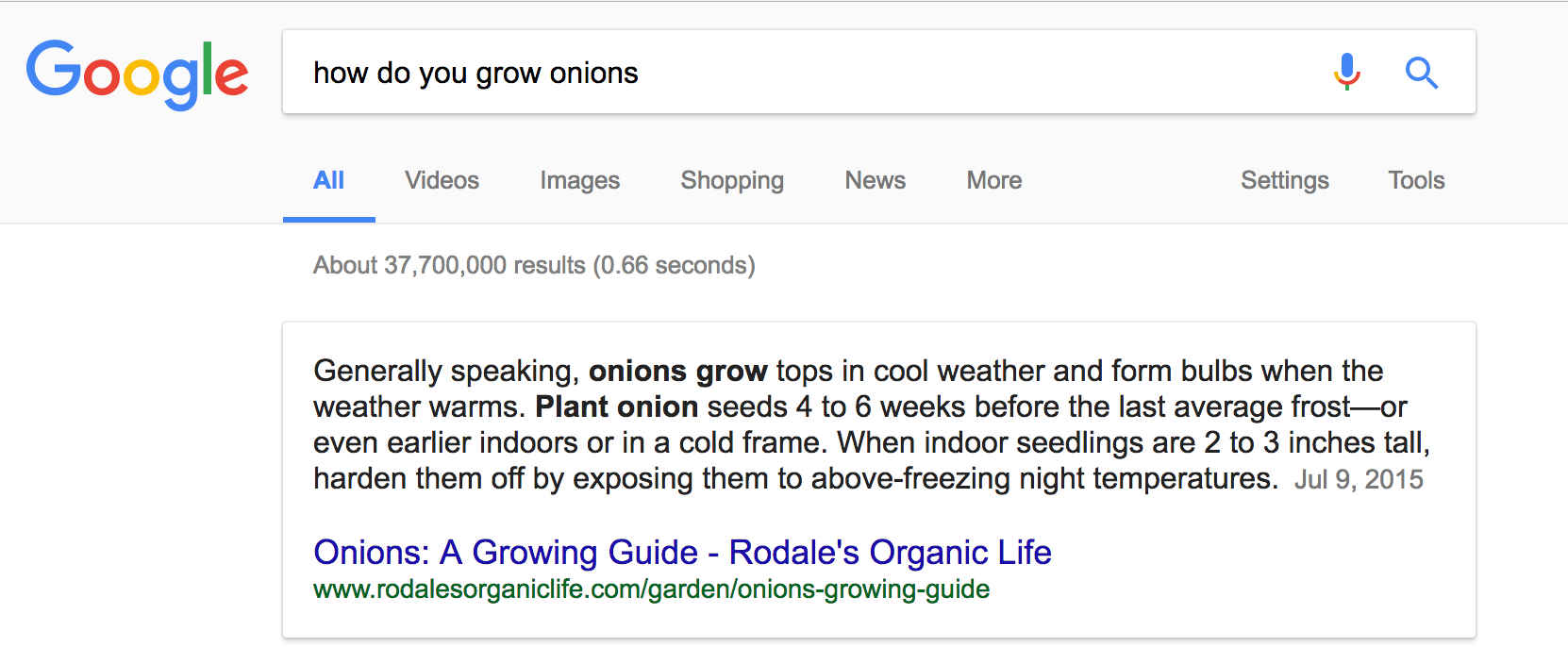Believe it or not, the world’s first search engine went live more than 25 years ago. What first went a little further than titles and paid ranking has evolved into one of history’s largest and most widespread industries. For over a quarter of a century, SEO experts and entrepreneurs have been working in tandem to figure out what drives consumers’ search habits and spin their findings into effective marketing strategies.
Every time we get a handle on it all, a new development comes to the surface. From emerging industries to updated algorithms, just what it takes to rise to the tops of the SERPs and stay there continually takes on an entirely different form. Most recently, what could be considered the biggest revolution since search engines themselves has taken the world by storm. Voice search has transformed the way the physical world interacts with the virtual one; by extension, it’s changed our approach to SEO for our clients.
Technology Takes a Turn
Much like the internet itself, voice query is the product of decades of research, development and improvements. You may remember the early days of voice recognition being integrated into mobile phones. Back then, simply asking your phone to call a certain friend could turn into a heated argument. As recently as two years ago, the rate of misunderstandings between humans and artificial intelligence lingered around 20 percent at best.

Today, the rate of error is more along the lines of eight percent with the number of recognised words surging by the thousands and more being added every day. This alone has encouraged more people to use technology to their benefit. We can now ask Siri, Cortana, Alexa and OK Google about anything from how to dress for the day to which song was at the top of the charts on our birthday and receive an accurate response. The scope of their capabilities are so monumental, they’d leave even Teddy Ruxpin slack-jawed and silent.
Each of the leading ladies in the voice search realm is fully capable of interacting with their humans on an almost friendly level. If you’ve ever allowed your children to ask Alexa what sound a dog makes, you’re probably well aware of her quirky sense of humour, not to mention her monumental capacity to make connections between what you say and the information to which she has access. Her top contenders are no different.
The key here is their programmed understanding of human thought patterns and context. By tapping into this power, we can turn the new tides of the SEO world in your favour, boosting you to the tops of voice-incited SERPs as well as old-fashioned typed queries. It’s all about staying on top of the changes and adapting to them.
Keywords
Until fairly recently, SEO revolved largely around short tail keywords or those with only one or two important words.
Items like “plumbers Brunswick”, “St Kilda restaurants” and “hotels Melbourne” helped choose the direction of businesses’ online content and bring it to the attention of local customers.
Long-tail versions, such as “summer cruises to Tasmania”, “discount all-terrain truck tires” and “inexpensive women’s formal wear” gave companies broader opportunities to reach people further along the sales funnel as well as members of a more national audience.
Obviously, we don’t walk up to a coworker and shout,
“Melbourne weather”

hoping to receive a comprehensive answer with few judgmental undertones.
Most of us wouldn’t stare blankly at a cashier and state,
“Nike in-store coupons”
When we use the magic of voice queries, we tend to speak in a more natural manner.
“Ok, Google, is it going to rain today?”
“Alexa, who played the leading role in Forrest Gump?”
In short, your vocal prospects are going to be using specific statements and questions when searching for products and services. Keywords as we’ve come to know and understand them aren’t as effective when it comes to voice search, so these new elements need to be incorporated into your content in order to prove your relevancy.
Knowing just which questions and commands will set you apart from the competition takes a great deal of research and thorough knowledge of how to work those into your content. We do the due diligence for you, and we happen to have the tools and expertise to make them work for you.
Written Content
Anytime you mention keywords, you’re touching on the subject of content, but the newly created parameters of voice search run quite a bit deeper than that. While helpful information relevant to your niche has been important since search engines started cracking down on quality, it’s even more vital to your rankings now. Your written content needs to be filled with pertinent details.
Along those same lines, the tone of your content is going to have to change if you want to bank on voice queries. Your website will need to head in a more conversational direction to dovetail with inquiries from your target audience. Explanations they’re looking for should be built carefully into your material.

Q and A pages have long been seen as a public service in the eyes of target audience members. They’re also another avenue for working in the right keywords to appeal to search engines. At this point, they’re more critical than ever.
When consumers use voice search, they typically phrase their needs in the form of questions, giving the who’s, what’s, where’s, when’s and how’s of life even more value. You can work these into your general content, but your Q and A section provide a more targeted platform. With the right strategy customised to your company and its products or services, this particular portion of your website could become one of your greatest marketing tactics.
Redirected Geo-Targeting
Geographically specific keywords and elements are critical to marketing your company among the local crowd in terms of traditional searches. Voice search doesn’t detract from the importance of providing this aspect; in fact, the opposite is true. Here’s why.
Those who’ve jumped on the voice search bandwagon are veering away from including their location in their queries.
They’ve gone from typing
“workout clothes Windsor” to asking,
“Where can I find workout clothes near me?”
The devices to which they’re talking already know where they are, so there’s no need to say it. It’s an unspoken bond.
Keep in mind, though, the dictation-taking divas of modern-day are still working in cahoots with the search engines. They transform voice into cyber-reality, combine it with the information they’ve stored and relay it all to their digital masters. In turn, web crawlers retrieve the most relevant entries they can find and send them back to their more human-like emissaries.

Going forward, the location might not be quite as important to the prospects landing on your site; however, it’ll be even more attractive to the search engines. Although this will change the way you present your website to the public, geographic information needs to remain in its coding. The transition may not be a simple one, but we’re here to make sure it goes as smoothly as possible for your company.
Write between the Lines
As mentioned, voice search and just how successful it is for consumers rely heavily on context. In the SEO and digital marketing realm, we’ve actually been prepping for this well ahead of time. An entire world of powerful secret coding lies beneath all the written content, graphics, images, contact information and other aspects you and your prospects see on the surface. We touched on this in the last point, but it goes well beyond slipping your location into your site’s HTML.
Schema markup was designed with the purpose of generating context around your basic website information. It gives search engines insight into what you mean rather than leaving them to fall back on keywords alone. Rich snippets are part of this aspect, offering an opportunity to further specify which information the search engines glean from your website and links to present to your prospects.
Imagine you’re performing your own voice searches on, say, creating a vegetable garden with your favourite form of artificial intelligence is on hand to be your guide.
You ask, “How do you grow onions” and receive a healthy list of search results. In the lead are a couple of paid ads for local companies selling seeds.
Those PPC ads are followed by a brief write-up describing the best time to plant and how to tell when it’s time to expose onions’ tops to the weather with a link provided so you can read further. Next in line are two entries consisting of three-quarters of an article title and varying descriptions of what onions are. Which do you choose?
If you share the mindset of about 90 percent of your peers, your eyes glaze over at the thought of the paid ads. You already know what an onion is, and there’s no indication the two entries describing them will give you any deeper insight. Anything beyond that point is pretty much irrelevant because, like most, you aren’t willing to venture further.

The one result providing coherent details and a link for further information would most likely be your obvious choice. It leaves little doubt as to whether or not you’ll find more relevant advice when you click on the link, and the site itself doesn’t initially appear to be trying to sell you what you already have. As it happens, that’s the one using schema markup.
If your digital marketing strategy doesn’t already have these elements in place, it should. As the popularity of voice search continues to climb, they’re going to become increasingly vital to your online visibility. It’s also worth mentioning only about 20 percent of websites were employing these powerful tools on the last count, so if you’re among the minority, you’ll have a considerable advantage right from the start.
We’ll put our knowledge of SEO to work for you to determine which snippets of your content would most readily appeal to your target audience, and we’ll put them into play to help propel you to the top of voice and traditional search alike.
Be Increasingly Responsive

Globally, the population of mobile devices already outweighs that of humans, and the margin continues to grow. Despite the increasing capabilities of stationary computers, the majority of voice searches are, and will most likely always be, performed via smartphones. Tablets run a distant second. In light of this, responsive design is going to become ever more vital in the years to come.
In the event mobile-friendliness isn’t part of your website design, you’re already missing out on more business than you might imagine. The gap is only going to widen going forward. From load time to appeal and ease of use, the design still matters immensely.
Continual Updates
With the improvements made to voice recognition and search capabilities over the last few years, searching for everything from recipes to vacation hotspots has become more convenient. This essentially means more people are browsing, and they’re doing so more often. From the perspective of both search engines and consumers, keeping a constant supply of fresh content, new links and promotional offers needs to be a top priority.
If you’re busy running your business and developing new products and services to offer your clients, you don’t exactly have time to continually attend to these aspects. We’re here to keep the ball rolling for you.
Will Everything Change?
While the rise of voice search is having an incredible impact on the way we approach SEO and digital marketing, some components of the industry won’t change. First of all, your website still needs to offer a well-rounded blend of written and visual content for search engines to index and visitors to see once they find you.
Secondly, inbound and outbound links will remain critical to your visibility and credibility. Although visitors will be reaching you courtesy of vocal interaction to a greater extent, they’ll still ultimately revert to visual mode at some point. When that time comes, those links will continue to help build their confidence in your company; not to mention, they’ll boost your relevance in the eyes of the search engines.
Your calls to action won’t be any less crucial, either. Whether visitors’ phones are reading your content to them or they’re researching without assistance, those still need to be in place. They’ll continue to play a role in ushering prospects further along the sales funnel.
In all likelihood, members of your target audience aren’t going to lose their faith in peers’ opinions any time soon. Your presence across social media will probably gain importance as the voice search movement progresses. Keeping up a positive reputation online won’t cease to hold more weight than all your other marketing efforts combined.
Plenty of changes are already in the making, and more are sure to come. Portions of your marketing efforts may not be altered completely, but they’re likely to be impacted in some way. We’re staying on top of the latest developments so we can help keep you on the cutting edge.
Don’t Ignore the Norm
According to the latest reports, more than half of teenagers and just under half of the adults are now using voice search on a daily basis. Upwards of 60 percent have only adopted the habit over the last year, and those numbers are expected to continue on their upward trend as technology progresses. While the figures are staggering, they’re not the be-all and end-all.
Not everyone in this category uses voice for every search being performed. At the same time, almost half the consumers in both age categories aren’t yet using voice search at all. Some don’t have smartphones whereas others balk at the idea of having a conversation with a machine. Voice isn’t going to consume the entire population; resistance isn’t futile, and some refuse to be assimilated.
If you ditch your conventional SEO efforts wholeheartedly, you’re going to lose a considerable portion of your target audience. To make matters worse, your competitors will be waiting with open arms to welcome the masses into their own folds. Fostering your future success isn’t about catering solely to the voice search trend. Balance is the key, but it’s difficult to master unless you have a thorough understanding of the industry. We’re specialists in the field.
Bottom Line

As it stands, SEO is a virtual house of cards. Every new element being added to the mix builds that structure taller, wider and more precarious. One rogue twitch is all it takes to start a cascade.
Leaving out any aspect of the digital marketing realm could mean missing out on a great deal of business. On the other hand, trying to incorporate them all could create chaos on the screen and actually hurt your ranking without the right training and expertise.
Voice search is still in its early stages, and no one is exactly sure which turns it’s going to take in the future. We’re keeping ourselves at the forefront of the industry, remaining up-to-date on the latest developments as they emerge.
Contact us, and let us help you tap into the unlimited power of the voice search movement while keeping all the conventional aspects of digital marketing up and running.

